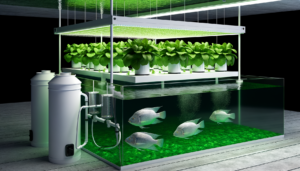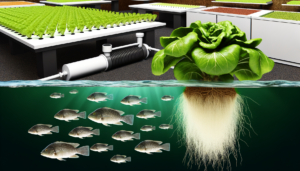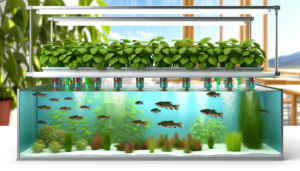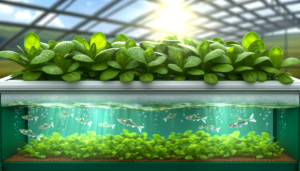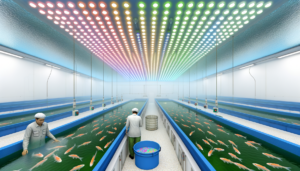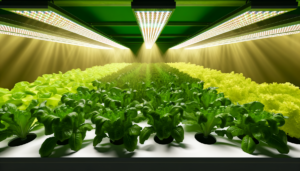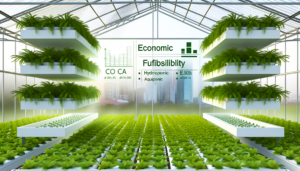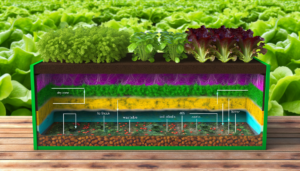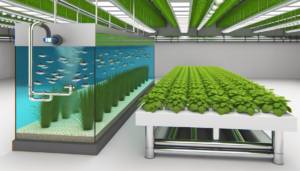Introduction to Aquaponic Systems Overview of Aquaponics Aquaponics is an innovative and sustainable method of food production that combines aquaculture (the raising of fish and other aquatic animals) with hydroponics (the cultivation of plants in water without soil). This symbiotic environment allows for the efficient use of resources, making it an ideal solution for urban farming and home … [Read more...]
Aquaponics
Introduction to Aquaponics Definition and Overview Aquaponics is an innovative and sustainable method of agriculture that combines aquaculture (the raising of fish) and hydroponics (the soilless growing of plants) to create a symbiotic ecosystem. In this system, fish waste provides an organic nutrient source for the plants, and the plants, in turn, purify the water, which is then recirculated … [Read more...]
Nutrient Management in Aquaponics
Introduction to Aquaponics and Nutrient Management Overview of Aquaponics Aquaponics is an innovative and sustainable form of agriculture that combines aquaculture (raising fish) and hydroponics (soilless plant cultivation) in a symbiotic environment. In an aquaponic system, the waste produced by fish supplies organic nutrients for the plants, which in turn purify the water that cycles back to … [Read more...]
Aquaponic Plant Nutrients
Introduction to Aquaponic Plant Nutrients Overview of Aquaponic Systems Aquaponics is an innovative and sustainable method of farming that combines aquaculture (raising fish) and hydroponics (growing plants without soil) into one integrated system. In this symbiotic environment, fish waste provides an organic nutrient source for the plants, and the plants help to purify the water, which is then … [Read more...]
Are aquaponic vegetables healthy?
Introduction to Aquaponics Definition and Basic Principles of Aquaponics Aquaponics is an innovative and sustainable method of agriculture that combines aquaculture (the raising of fish and other aquatic animals) with hydroponics (the cultivation of plants in water without soil). This symbiotic system leverages the natural relationship between fish and plants to create a self-sustaining … [Read more...]
Philips Aquaculture
Introduction to Aquaculture Lighting The Role of Light in Aquaculture Light plays a pivotal role in the realm of aquaculture, influencing not only the growth and health of aquatic organisms but also their behavior and reproductive cycles. In natural environments, sunlight serves as the primary light source, dictating the rhythms of aquatic life through its intensity, spectrum, and photoperiod. … [Read more...]
Supplemental daily light integral by LED light to improve …
Introduction to Supplemental Lighting in Agriculture The concept of Daily Light Integral (DLI) The Daily Light Integral (DLI) is a crucial concept in plant sciences, representing the total amount of photosynthetically active radiation (PAR) received by a plant in a single day. It is measured in moles of light per square meter per day (mol/m2/day) and directly correlates with plant growth, … [Read more...]
Economic Feasibility
Introduction to Economic Feasibility in Modern Agriculture Defining Economic Feasibility Economic feasibility refers to the assessment of the financial aspects of a project or system, determining whether the potential benefits outweigh the costs involved. In the context of modern agriculture, economic feasibility plays a crucial role in the adoption of innovative farming techniques, such as … [Read more...]
Aquaponics Grow Bed Depth – What You Need to Know
Introduction to Aquaponics Grow Beds Defining the Grow Bed in Aquaponics Aquaponics is a symbiotic integration of two disciplines: aquaculture, which involves raising fish, and hydroponics, the practice of growing plants without soil. At the heart of this system lies the grow bed, a key component where the plants are cultivated. The grow bed in aquaponics serves multiple functions: it houses the … [Read more...]
Basis of Aquaponics
Introduction to Aquaponics Definition and Basic Concept Aquaponics is an innovative and sustainable method of food production that combines aquaculture (the raising of aquatic animals such as fish) with hydroponics (the cultivation of plants in water without soil). This symbiotic system leverages the natural relationship between fish and plants to create a self-sustaining environment where the … [Read more...]

